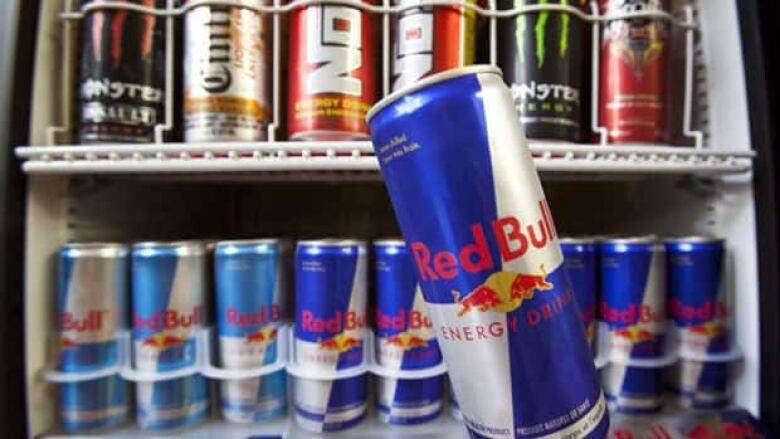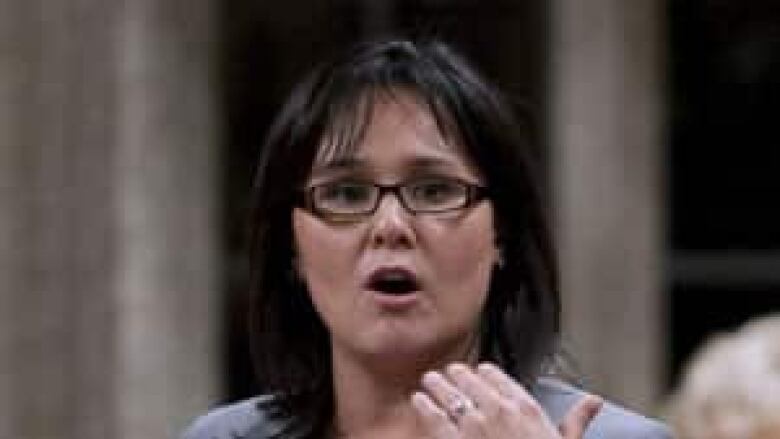Energy drink labels to contain warnings
Health minister doesn't take expert panel's advice on caffeine products

Health Minister Leona Aglukkaq is directly contradicting the advice of an expert panel and moving to change the classification of energy drinks from "natural health products" to "foods."
The regulation changes announced Thursday do not include banning the sale of energy drinks to young people as the panel recommended;nor do they restrict where they can be sold.
At a news conference in Ottawa on a university campus, Aglukkaq said Canadians think of energy drinks as foods, not health products, and as a result, the government is changing how it regulates them.
The health ministersaid a wide range of views were considered, noting that some people want the drinks sold by pharmacists while others have been calling for less-stringent rules. She said that the government is taking a "balanced approach" that will allow Canadians to make their own informed choices about what they consume.
"I firmly believe it is up to individuals as well as parents to make their own decisions when it comes to what they eat and what they drink. That's why our focus is on giving people the information they need to make good, informed decisions," she said.
Sherejected the notion that she didn't go further with the new rules because of pressure from the industry.
"If I was afraid to annoy the industry, I wouldn't be making this decision today," she responded.
The shift from regulating the drinks as natural health products to considering them to be foods means the popular beverages will have to carry labels listing their ingredients, allergens and nutrition information.
Beyond this change, Health Canada is imposing further requirements for the caffeine-filled beverages:
- Allowing amaximum concentration of 100mg of caffeine per 250 ml.
- Setting a maximum concentration of 180 mg of caffeine in any single-serve beverage.
- Requiring labels to indicate total caffeine content and say the product is a source of high caffeine.
- Limitingthe types and levels of vitamins and minerals that can be added.
- Requiring statements on the product saying it is not recommended for children, pregnant and breastfeeding women.
- Making manufacturers add a warningthat the drink shouldn't be mixed with alcohol.
The shift in regulations from natural health products to foods won't mean major changes for the industry.
According to Aglukkaq's department, most of the products on the market already meet the caffeine limits that will allow them to be sold as foods and the only change companies will have to make is to revise their labelling.
Panel's key advice not taken
In announcing the new regulatory framework and requirements, Aglukkaq rejected keyrecommendations from an expert panel that reported to her last year.

The eight-member panel wanted energy drinks to be referred to instead as "stimulant drug containing drinks" and for that term to be on the product label. The labels should also say that adverse reactions to caffeine include insomnia, anxiety, allergic reactions, palpitations and withdrawal, according to the panel.
It specificallyrecommended that the drinks should not be regulated as foods, but should be treated as drugs and sold the same way caffeine in a tablet form is soldin pharmacies, over the counter.
The panelalso wanteda ban onpeople under 18 years old purchasing the drinks.
Aglukkaq acknowledged the popularity of the drinks is growing among teens and children, whodon't give a lot of thought to ingredients.
"I believe today's changes will be especially helpful to parents of teenagers who regularly consume energy drinks," she said.
Change could take 2 years
Health Canada will work with industry to implement the regulatory changes and "minimize market disruption," meaning the drinks aren't likely to disappear from store shelves during the transition period. Companies are expected to meet the new requirements within 18 to 24 months of receiving their market authorization.
The new measures will not satisfy those who have been calling for a ban on the sale of the beverages to young people.
Health Canada says it doesn't recommend the drinks for teens, but it isn't moving to restrict their access. Instead, it is "directing industry to further strengthen its code of practice" when it comes to marketing and promoting the products with young people.
It also says it is using social media platforms to raise awareness among young people about the risks of consuming too much caffeine.
The expert panel said that because energy drinks should be considered drugs, companies should be prohibited from distributing free samples. The panelalso wanted a ban on advertising the products to children and youth.
Aglukkaq said the government prefers its "balanced" approach and that more awareness about the risks of too much caffeine will help consumers and parents make informed choices about the products.
The NDP's health critic, Libby Davies, said the new labels are a positive step but she's concerned about the amount of caffeine that is still allowed in the beverages, and, about the marketing of them to young people. She said Aglukkaq should have taken stronger action on the aggressive marketing tactics of some companies.
"She needed to come out and make it clear that the government of Canada does not think that that's an acceptable practice," said Davies. The NDP MP said the government did take some positive steps but overall, caved in to the industry.
The Canadian Beverage Association, which represents makers of energy drinks and otherbeverages,said it was supportive of Health Canada's decision to regulate energy drinks as foods.
"We are still concerned that energy drinks are being treated as a unique product with specific labeling requirements unlike other beverages in Canada containing caffeine," Stephanie Baxter, senior director ofcommunications for the group, said in a statement.












_(720p).jpg)


 OFFICIAL HD MUSIC VIDEO.jpg)
.jpg)



























































































